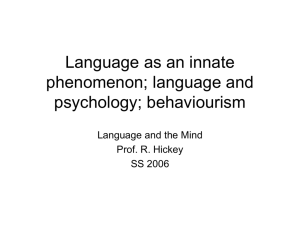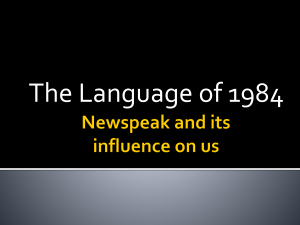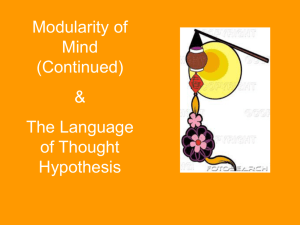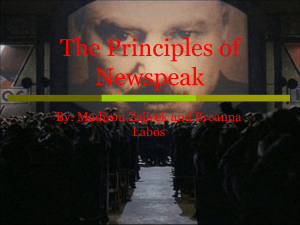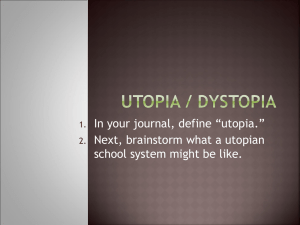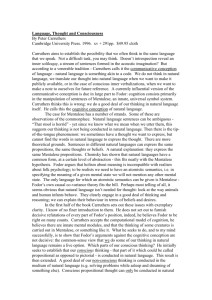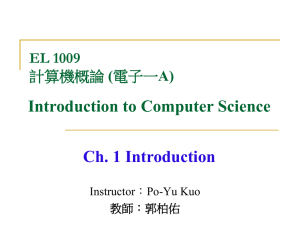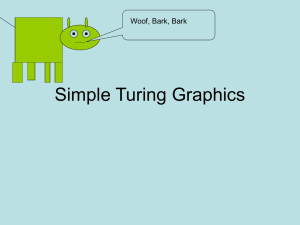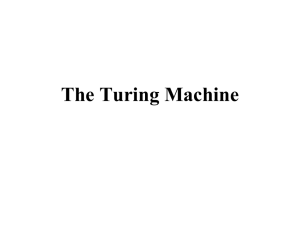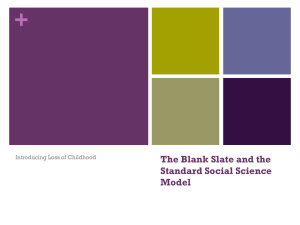PowerPoint Presentation - 3. Mentalese
advertisement
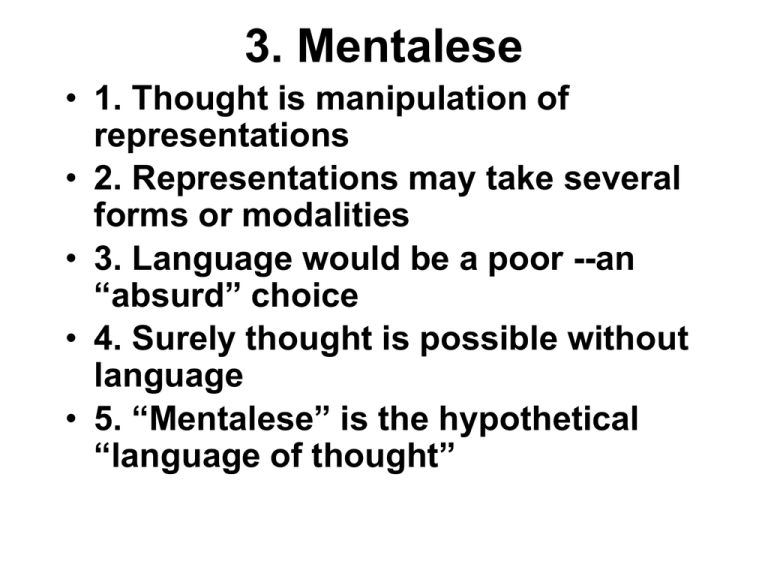
3. Mentalese • 1. Thought is manipulation of representations • 2. Representations may take several forms or modalities • 3. Language would be a poor --an “absurd” choice • 4. Surely thought is possible without language • 5. “Mentalese” is the hypothetical “language of thought” What does that mean? • Thoughts transcend particular human languages • Our beliefs are not “in” English • Nor is chemistry “in” German • Is sensory info coded into mentalese? Is a object’s form conceptualized differently if one sees it or feels it? Newspeak (Orwell, 1984) • "the purpose of Newspeak was not only to provide a medium of expression for the world-view and mental habits proper to ..(English Socialism of the day) but to make all other modes of thought impossible.55 (Orwell's 1984)" Newspeak 2 • "there would be many crimes and errors which it would be beyond his (a person growing up with Newspeak) power to commit simply because they were nameless and therefor unimaginable. 56” Newspeak today? • January 23, 2005 Boston Globe • “In debate over Social Security changes, one word is key” • “Semantics are very important … no one is advocating privatizing Social Security” (Rep. Bill Thomas, House.. Committee chairman.) • “they’re personal accounts, not private accounts..” “a conventional absurdity” that L=T! • "The idea that thought is the same thing as language is an example of what can be called a conventional absurdity..(which) goes against all common sense.."57 Are Thoughts “merely clothed in words?” • "Is thought dependent on words?...Or are our thoughts couched in some silent medium of the brain--a language of thought--, or "mentalese"--and merely clothed in words whenever we communicate them...? No question could be more central to understanding the language instinct. p.56" More or less! • "Knowing a language, then, is knowing how to translate mentalese into strings of words, and vice versa. 82” • "if babies did not have mentalese to translate to and from English, it is not clear how learning would take place.." T≠L • "We have all had the experience of uttering or writing a sentence, then stopping and realizing that it wasn't exactly what we meant to say....there has to be a 'what we meant to say' that is different from what we said. p.57" Language & thought background • EMPHASIS ON T=L • Locke (1632-1704) • W. Humboldt (1767-1835) • 19th century linguists • • • • Vygotsky (1896-1934) Sapir (1884-1939) Whorf (1897-1941) behaviorists • • • • • • EMPHASIS ON T≠L Descartes (1596-1650) Leibniz (1646-1716) W. Humboldt (1767-1835) de Saussure (1857-1913) W. Kohler (1887-1967) • • • • • Piaget (1896-1980) Turing (1912-1954) Chomsky (1928- ) Fodor Pinker Descartes • Language reflects thought • Those without language find a way to express them if they have them • (D was familiar with sign language use) • (D knew a larynx unnecessary for language) Locke • men .. by the use of their natural faculties, may attain to all the knowledge they have, without the help of any innate impressions; and may arrive at certainty, without any such original notions or principles..p.38...No proposition can be said to be in the mind … which it was never yet conscious of....15. • "Words, are like knots that tie bundles of ideas together...Ideas may be "bundled" differently among individual speakers ...and among different languages." p.346. Leibniz • Anti-Locke -- innate ideas are like a bust in marble • Predispositions to certain ideas exist in mind • All ideas based on recombination of basic ones - kind of mental chemistry • “a calculus of thought” Wilhelm von Humboldt • Claimed by empiricists and others • First explicit writer on linguistic relativity (Whorf’s hypothesis) • Yet also recognized the universal and infinite, creative aspect of language beyond words 19th century linguists • Figured out that many languages shared a common ancestor and reconstructed much of the history of human language from fragments • Established some rules of language change, e.g. Latin [f]->Germanic [b] • frater, brother, brat De Saussure • “father” of modern linguistics • Signs are arbitrary (cf. Pinker) • Distinction between competence and performance • Distinction between diachronic knowledge (history) and synchronic (current) knowledge Sapir-Whorf hypothesis • Language structures determine thought and/or perception • (weaker) language influences thought and/or perception • Current research shows some perceptual effects, e.g. on color categorization • But little evidence for large, cognitive effects, e.g. Papafragoua, A., Li, P., Choi, Y., & Han, C.-h. (2007). Evidentiality in language and cognition. Cognition, 103(2), 253-299. (BB) They have a word for it; does it matter? • • • • • Hopi concepts of time Mokan time Current English time Relative reference vs direct reference (when you take your shower vs 5:45am) Behaviorists • Thinking is sub-vocal speech (Watson) • Focus on words and meaning as conditioned response or association • No concern for rules nor creativity • Sympathy with Locke and relativists on language as a medium of thought Jerry Fodor • Wrote “The Language of thought” coining term “mentalese” • language and thought? • word & concept linguistic determinism/relativity • • • • • • "Whorf-Sapir hypothesis" language as convention/behaviorism color vision/color names (see Miller) 100 words for snow myths Hopi "time" myths (see video) language-cognition experiments "so what?" p.66 What about Whorfian studies? • Read Pullum’s printer parody on words for snow! P.65 • Some studies show words have effects on memory or categorization • Interesting but undemonstrated was Whorf’s idea language might advance the acquisition of concepts thought without language 67 • • • • infant cognition Humans without language? Non-human primate logic human imagery – anecdotes – Shepard letter rotation Turing machine • "reasoning is deduction" p.74 • This follows the idea that much of thinking is a kind of computation. • (does everyone know vaguely about Turing’s contributions?) • The idea is even older--”thought as algebra” W. James cites several passages on this theme (1890;270) Turing 2 Thinking and being deaf • Pinker on Schaller’s Ildefonso • “despite their isolation from the verbal world, they displayed many abstract forms of thinking, like rebuilding broken locks, handling money, playing card games, and entertaining each other with long pantomined narratives.” 68 James, W. (1892). "Thought before language: A deafmute's recollections." The Philosphical Review 1(6): 613-624. (JL- recollections or confabulations?) William James 1890-92 • Melville Ballard (p.266; James 1890) • “I could convey my thoughts.. To my parents.. By natural signs and pantomine… • Mr. d’Estrella (1892; p.63) “his narrative tends to discountenance the notion that no abstract thought is possible without words… • "..for nothing is commoner than to have a thought, and then to seek for the proper words in which to clothe its important features.”(WJ--not Pinker!) More from Ballard • Nearly all human emotions absent • “everything seemed to appear blank around me except the momentary pleasures of perception” But.. Compare with dreams • • • • You awake experiencing a dream. But when did the dream occur? In the past while you were sleeping? Or just a moment ago, constructed upon the specific bio-states of your brain at that time. • Could there be a dream without a representational system like language? • How well can language interpret other states of brain/mind? Helen Keller • "Before my teacher came to me, I did not know that I am. I lived in a world … that was no-world. I cannot hope to describe adequately that unconscious, yet conscious time of nothingness...Since I had no power of thought, I did not compare one mental state with another". But… • Helen Keller lost her senses just before she was two-- plenty of time to internalize some language and concepts of the world. • For example, she would be in Piaget’s symbolic stage of development. And in some ways more cognitively advanced than a normal chimp. • Still interesting but not total proof of the role of language. Any Conclusions? • I don’t know any case where deaf/blind with NO input has been taught some communication system with a successful result. • Home sign seems universal but needs a community to become a full language. • compare pidgin->creole • • • • • • Why can't English serve as our "internal medium of computation?" Ambiguity (several types) lack of logical explicitness co-reference deixis or pointing references synonomy Representations inside the head and sentences at cross purposes 81 Language details can have some impact on thinking • Processing speed might be different due to syntax differences • First phonology influences later perception of sounds (hence accents) • Having a word for it influences memorylexicalization effects • any evidence of recoding memories into mentalese for multiple modality access? L->T continued • Syllable length effects • Priming/association effects • (example?) Language and thought • • • • Thoughts automatically clothed in L. That’s how we know our thoughts. Language primes thoughts. Hence we can somewhat manipulate thoughts via language even though we don’t think “in” L. • This is probably reflective consciousness. • And why we have the “illusion of conscious will.” The end For now • Simcock Hayne (2002) • 3 age groups, 27,33,39 tested • Retested 6 and 12 months later for memory of experience with machine. • Vocabulary assessed • Memory assessed in 3 modes verbal, photo, action. • Children remembered …
